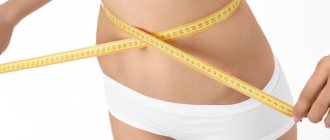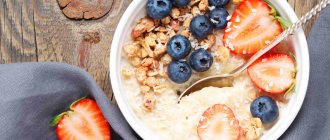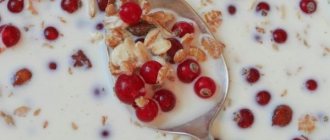“Space diet” by Sergei Sivokho: without denying himself anything, the comedian lost 42 kg in 3 months
Losing weight is promoted not only by sports, but also by proper nutrition. Healthy low-calorie food will not only saturate your body, but also fill it with useful substances.
A diet for weight loss should be varied and consist exclusively of healthy recipes and fresh foods. Convenience foods and other unhealthy foods will not only aggravate your health, but will also add stress to the body, in the form of a couple of extra pounds.
We’ll look at how to choose the right food for breakfast, what to avoid at lunch, and what an ideal dinner for weight loss should be like in the next article.
How should you eat to lose weight?
To “start” the process of losing weight, you should limit yourself to high-calorie recipes and devote your time to proper nutrition. But you shouldn’t get carried away with this, since refusing large amounts of food is no different from regular fasting. And frequent hunger strikes not only relieve a person of excess weight, but also significantly deplete the body.
How I lost half my weight in six months
To lose weight without harming your health, you need to properly distribute food throughout the day. The correct breakfast, lunch and dinner for weight loss depends on the correct ratio of proteins, fats and carbohydrates in food. Calculate the required number of calories per day based on the fact that you are aiming for the number on the scale. Moreover, there are different calculations for men and women:
For men: 66 + (13.7 x body weight*, kg) + (5 x height, cm) - (6.8 x age in years)
popular:
- ✅ Effective Biocomplex formula helps get rid of food addiction
- ✅ Strange but effective weight loss methods used by celebrities
- ✅ Minus 24 kg without leaving home! A Muscovite who lost weight in quarantine “blew up” Russia with her recipe
For women : 655 + (9.6 x body weight*, kg) + (1.8 x height, cm) - (4.7 x age in years)
To correctly calculate your daily calorie needs, you must also take into account the rhythm of your life. To lose weight, you need to multiply the result by:
- with a sedentary lifestyle - by 1.2;
- with average activity (exercises up to 3 times a week) – by 1.375;
- at high activity (up to 3-5 times) – by 1.55;
- at high loads up to 7 times a week – by 1.725.
For the greatest weight loss effect, for breakfast, lunch and dinner it is necessary to gradually reduce the amount of calories consumed, from 15 to 25 percent.
After calculating the daily calorie needs, they must be properly distributed for breakfast, lunch, dinner and snacks:
An innovative drug for losing weight by 30-40 kg! Removes even age-related fat without chemicals, liposuction, diets or exercise. Exercises
- Breakfast should be the most satisfying and high-calorie - 30% of the daily value;
- Lunch helps maintain energy for the whole day, in the form of 40% of the daily calorie intake;
- Dinner is the easiest, most quickly digestible meal of the day. Its calorie content should not exceed 10% of the daily value;
- Snacks contain 20% of your daily calorie intake. Their quantity should be 3-5 times a day.
Proper breakfast
Proper nutrition for breakfast for weight loss is necessary to properly start metabolism and obtain energy for the whole day. Each breakfast should be observed between 7 and 9 am.
If you often skip breakfast, the human body will “break” into snacks, in the form of prohibited foods:
- chocolate;
- buns;
- fatty sausage;
- fresh bread made from premium flour;
- fast food.
Let's look at what proper nutrition should be like for breakfast:
- boiled eggs;
- bran;
- steamed omelette;
- vegetables - cucumbers, tomatoes, zucchini, carrots, cabbage, broccoli, bell peppers;
- fruits - citrus fruits, apples, pears, plums, apricots, peaches, strawberries;
- dried fruits - raisins, figs, prunes and dried apricots;
- porridge made from oatmeal, buckwheat and rice;
- light soups from the above cereals;
- low-fat cottage cheese.
Also, morning is the ideal time for sweets, since all the calories acquired at this time are wasted during the day. If you want to treat yourself to low-fat fruit yogurt, honey, sweet cottage cheese, marshmallows or marmalade for breakfast or lunch, do not deny yourself anything.
How to avoid obesity and regain an erection at any age?
What's for lunch?
Proper nutrition for lunch for weight loss should contain exclusively proteins:
- eggs;
- milk;
- cottage cheese;
- chicken meat;
- kefir;
- beans;
- mushrooms.
And carbohydrates:
- porridge - pearl barley, barley, buckwheat;
- pasta;
- Rye bread;
- bran;
- broccoli, cauliflower and white cabbage;
- fruits - apples, plums, pears, apricots, peaches;
- vegetables - tomatoes, cucumbers, lettuce, celery, radishes.
For proper nutrition, the following weight loss meal options :
- low-fat soups made from chicken or turkey meat;
- porridge cooked in water;
- stewed zucchini, tomatoes, peppers;
- bran.
With proper nutrition, carbonated sweet drinks and foods containing alcohol are strictly prohibited .
To lose weight, you should not completely limit yourself to fatty foods, as this causes a loss of strength, as a result of which the body is depleted, especially if you play sports.
Diet dinner
“Space diet” by Sergei Sivokho: without denying himself anything, the comedian lost 42 kg in 3 months
Now let's look at proper nutrition for dinner for weight loss:
- low-fat cottage cheese, cheesecakes, cottage cheese casseroles;
- milk jelly;
- buckwheat and rice kashm;
- yogurt with fruit and cinnamon;
- baked apples.
A diet dinner for weight loss should be your last meal; no snacks after it are allowed. Food should be low-calorie and contain proteins - omelettes, milk, cottage cheese, kefir. Also, when losing weight, unsweetened fruits and berries are allowed in moderate quantities - apples, pears, raspberries, currants. Smoothies are a great alternative for a light dinner for weight loss.
Before eating, for weight loss it is recommended to drink a cup of tea. This drink helps saturate the body, as a result of which you will eat less at dinner and thus speed up the weight loss process.
For weight loss, you should exclude mushroom and meat dishes from your dinner diet, as they cause headaches. Replace the above with proper nutrition:
- stewed zucchini, carrots, tomatoes, peppers;
- kefir, milk, fermented baked milk;
- trout, salmon and perch dishes.
Detailed diet menu for a hearty breakfast
What can you eat for breakfast following the proposed nutritional system? Almost anything – there are no forbidden foods as such. It is important to maintain a balance between proteins and carbohydrates and not exceed the 600 kcal mark. Poultry, veal, chicken or quail eggs, toast with cheese, cottage cheese with fruit, pancakes with berries, milk porridge or cereals cooked in water.
You can supplement your breakfast with a piece of cake, gingerbread, marmalade, or a chocolate bar - the choice of dessert depends on your taste preferences. Ideal snacks include a handful of nuts, a vegetable or fruit smoothie, or just your favorite fruit.
A sample menu might look like this:
| Breakfast | Dinner | Dinner | |
| 1 option | Pancakes with cottage cheese, toast with ham, a cup of natural coffee and a small chocolate bar. | Stewed rice with vegetables, a glass of mint tea, peach. | Boiled egg, zucchini caviar, berry smoothie. |
| Option 2 | A serving of brown rice with a piece of boiled veal and fresh cucumber. A cup of tea with gingerbread. | A piece of chicken breast. Cabbage salad with lemon and olive oil, a glass of apple juice. | Toast with boiled fish and lettuce, lemon water. |
Learn more about intermittent fasting and why it's better to skip dinner rather than breakfast.
Intermittent fasting gained popularity back in the early 2010s, after the release of the book 'The Fast Diet' by British journalist Michael Mosley. Then many became interested in nutrition according to the 5:2 protocol, in which the usual diet was followed 5 days a week, and daily calories were limited for 2 days. In 2021, the phrase “intermittent fasting” (IF) resurfaced on the Internet and became the most popular diet query on Google. But new research on this diet shows interesting results - most likely, intermittent fasting is most effective if it corresponds to circadian cycles. Today, together with nutritionist Akkumis Berikovna, we will talk about the advantages and disadvantages of this diet and why it is better to move your “eating window” closer to the time you wake up.
What is intermittent fasting?
For those unfamiliar with intermittent fasting, it is an eating pattern in which the day or week is divided into periods of eating and fasting (or calorie restriction). The most popular pattern is the 16:8, where the day is divided into a 16-hour fasting window and an 8-hour eating window. As they say, ISIS disciplines a person and at the same time simplifies the diet itself, since the only limitation is time. In addition, a person is already hungry every day during sleep, so an additional 8 hours without food does not seem overwhelming. Another advantage is the flexibility of this regime - for those who wake up late, you can set the beginning of the eating window closer to lunch. However, nutritionist Akkumis still advises not to leave meals until the second half of the day (we will explain why below): “To get rid of excess weight, the most effective time of the eating window is from 7 am to 3 pm, but it can be shifted to the period from 10 am to 6 p.m". It should be noted that IF differs from therapeutic and conscious fasting, in which the duration of fasting is much longer.
What types of intermittent fasting are there?
Some people shorten their fasting periods to 14 hours. Diagram 14:10 is a good introductory start for those just getting acquainted with ISIS. Akkumis also cited several other types of IS:
- The Leangains protocol is the classic 16:8 regimen, but skips breakfast and the first meal after lunch.
- Eat-Stop-Eat diet (eat-starve-eat) - 24-hour fasting 1-2 times a week, combined with a normal diet on the rest of the days.
- The Warrior Diet involves fasting throughout the day (about 20 hours) and eating a hearty dinner before bed. Some people observe incomplete fasting - they eat only fresh fruits and vegetables during the day.
- Protocol 5:2 - limiting calories to 25% of their required daily amount on any 2 days a week, the remaining 5 days follow a normal diet. The usual calorie limit on a fasting day for women is 500 calories per day, for men - 600. Meals are divided into 2 times, with an interval of 12 hours (250 calories in the morning and 250 calories in the evening).
Intermittent fasting: pros
Although initially the main goal of IG was weight loss, recently it is often practiced as a preventative method to combat aging. Accumis explained the reason for the anti-aging effects of intermittent fasting:
“Prolonged fasting (several hours) “pushes” mitochondria to improve their functioning and regulates the production of growth hormone, which stimulates cell repair. In addition, the process of cell autophagy is associated with fasting. To explain it in simple terms, this is the process of self-eating or self-cleaning of the cell when the supply of nutrients stops. As a result of adaptation to stress (starvation), the cell feeds on itself - it starts optimizing its resources and destroying unnecessary cellular components for nutrition, which are transformed and become building material for new cell components. Thus, due to fasting, a process of high-quality cell renewal occurs.”
IGs are also used to prevent cardiovascular diseases such as atherosclerosis and hypertension, obesity, asthma and rheumatoid arthritis. And some sources suggest that eating an 18:6 diet may trigger metabolic changes that lead to increased resistance to stress and longer life.
“Results from some short-term studies have shown beneficial effects of IG on glucose tolerance, insulin sensitivity and reduction in inflammatory markers, and studies in mice have demonstrated improvements in glucose tolerance and lipid profiles. Moreover, a relationship was found between IH and the development and growth of tumors, as well as a positive effect on the hormonal regulation of appetite,” Akkumis said. But the nutritionist emphasizes that more in-depth research is needed to determine the actual effect of IG on the state of cells, organs and systems of the human body.
Even because there are many types of ISIS, it is difficult to come to an unambiguous result. Such fasting can obviously help with weight loss, but only with moderate nutrition. If you follow intermittent fasting, but eat “for three” at each meal, then you are unlikely to achieve any result. It is also possible that the observed effects during IH are achieved due to a caloric deficit - yet less food is eaten during the 8-hour window than usual.
But Accumis explains that for many, IG is much easier to maintain than other calorie-restricted diets: “It helps dieters enjoy food more, can teach the difference between hunger and appetite, control overeating and reduce relapses, help people eat healthier, and overcome the plateau effect when losing weight.”
Intermittent fasting: "against"
This diet also has some significant disadvantages. The nutritionist outlined the adverse effects of IG: “During fasting, the body first burns glycogen (glucose stores in the liver and muscles) and then fats, but it is important to remember that this does not happen immediately. First, your body adapts to fat burning, that is, it learns to burn fats instead of carbohydrates for energy. During this process, at the very beginning of fasting, especially for beginners, unpleasant phenomena such as hypoglycemia, headaches, tachycardia, weakness, nausea and bad mood may occur. As the body adapts, the condition returns to normal. There is also a risk of not getting all the necessary nutrients, vitamins and microelements due to the small eating window, so following the principles of a healthy diet and monitoring breakdowns is especially important.” Akkumis advises having a snack if weakness or headaches bother you for a long time.
The nutritionist also warns that you need to be very careful with long-term fasting (over 24 hours). “You should not fast for a long time without consulting a doctor: ketoacidosis (increased ketone levels) can be deadly. This most often happens with type 1 diabetes. Also, the breakdown of fats is fraught with a decrease in pH, that is, an increase in acidity, so you need to monitor the pH of your blood and urine. Additionally, prolonged fasting can negatively impact adrenal and thyroid function, increase anxiety, cause hormonal imbalances, depression, brain fog, insomnia, and reduce fertility, especially in women,” Akkoumis added.
How to eat, and who is not suitable for ISIS?
Before starting any diet, it is best to consult a nutritionist. Still, there are general contraindications, such as:
– Gastrointestinal problems – Eating disorders – Hormonal imbalance – Pregnancy or breastfeeding, or if you are planning a pregnancy – If you are taking medications that are associated with meals – If you are on insulin or other glucose-lowering medications
If you are healthy and doing intermittent fasting, it is best to practice healthy eating when you eat. Akkumis advises eating complete proteins (at the rate of 1 g per kg of body weight per day), healthy fats, whole grains, fruits, vegetables and avoiding high-calorie and refined foods and dishes. During fasting, you can drink water without restrictions, black tea and coffee without sugar.
And for those who are actively involved in sports and want to adapt to intermittent fasting, the nutritionist recommends following the 5:2 plan. In this case, you should distribute your workouts on those days when you are not fasting. Alternatively, you can exercise at the beginning of the fast, when you have already eaten and are full of energy, or at the end, when you can snack before or after your workout.
Why is it better to skip dinner rather than breakfast?
While there used to be some freedom in choosing when to eat, now more and more research suggests that the timing of the first meal plays an important role. For example, scientists at Harvard University found that those who start and finish meals earlier lose 25% more weight than those who eat later.
This has been linked to the human body's circadian cycles and how food intake affects them. Accumis explained this phenomenon:
“The fact is that the human body biochemically obeys a certain circadian rhythm. Circadian rhythms are fluctuations in the intensity of various biological processes associated with the change of day and night. This includes metabolism, sleep, wakefulness, food intake and absorption. The correct rhythm increases the life expectancy of the body and reduces the risk of developing various diseases. If the eating window is immediately after waking up, then the fasting period will occur during the less active part of the day and night sleep, that is, when the body’s demand for food is reduced. Even though we sleep at night, our body still needs fuel, which we draw from our internal reserves by eating our glycogen (glucose stores), so in the morning we wake up hungry. A proper breakfast will give us the necessary amount of energy to last until lunch. Moreover, in the morning we produce more insulin and have the highest sensitivity to insulin than at any other time of the day. Therefore, everything we eat is quickly and efficiently absorbed and is not stored as fat (compared to late meals).”
In addition, researchers at the University of Washington discovered that circadian cycles directly affect our gut microbiome, and more specifically, the immune cells in the gut. That is, disrupted circadian cycles and late meals can lead to gastroenterological problems. Therefore, when doing intermittent fasting, it is advised to focus on your circadian cycles. Nowadays, this diet is increasingly called the circadian diet.
Accumis also explained that proper intermittent fasting helps with disrupted circadian cycles. Fasting activates alternative metabolic pathways and affects the functioning of genes and proteins key to circadian rhythms. It reduces the activity of proteins that regulate the daily functioning of the liver and skeletal muscles, and puts the corresponding genome into standby mode, which helps form the desired circadian rhythm at the next meal.
Basic diet rules
Despite the diet's focus on limiting evening meals, the main focus is on the diet during the day. Only a competent approach and the right products can achieve the desired result. A set of simple rules for losing weight:
- Small meals throughout the day are encouraged. The menu can be divided into 3-5 main meals, and breakfast should provide maximum energy for daily activity.
- The last meal should be before 5-6 pm, and its size and calorie content is limited. Just salads, dietary proteins, low-fat dairy products are suitable. After eating, you can only drink plain water.
- During the period of adaptation to a new diet, you should use green, herbal teas, and drinks with lemon. If you really want sugar, it should be used in limited quantities.
- Part of the total amount of calories consumed in the evening must be received by the body during the day.
- Ensuring vitamin balance. Since the diet does not limit the choice of foods, you need to monitor the nutrients you receive.
- Drink plenty of water to ensure proper functioning of the body's internal systems. Healthy people are recommended to drink 2 to 3 liters of fluid daily.
The main focus is on the last meal. A light dinner without complex carbohydrates, including cereals, flour products, bread, will ensure the effectiveness of the program. To increase results, you should switch to an active lifestyle.
Requirements for dinner
The simpler the food in the evening, the faster the body will digest it and release it before bed. Complex foods and extreme satiety will affect your stomach at night. As a result, your appetite will worsen in the morning and your eating schedule will be disrupted. For this to happen, dinner must comply with a number of rules:
- Light foods, preferably vegetables and dietary meat, steamed or boiled in water. Alternatively, cook in the oven without adding oil, which reduces the fat content and calorie content of the food.
- Any low-calorie foods, including high-fiber vegetables. You need to eat well so that you don’t feel hungry later.
- Avoid starchy foods, bread, sweets, cereals and other foods high in complex carbohydrates.
- It is not recommended to use sugar and fruits. A small amount of such food increases the daily caloric intake, so the effectiveness of the diet decreases.
- Eat only one meal and set time limits. 4-6 hours before bedtime, no food should enter the body, with the exception of water and tea.
The diet includes a light dinner. If you violate this rule, the results and effectiveness of its application are reduced. The wrong approach can cause you to gain excess weight.
Separate meals: basic principles and sample menu
3. It is not recommended to consume two protein products at one time.
4. It is not recommended to consume fats and proteins at the same time.
5. It is not recommended to eat sour fruits with proteins. Oranges, lemons, tomatoes, pineapples, cherries, sour plums, and sour apples should not be eaten with meat, nuts, or eggs. 6. It is not recommended to eat foods containing sugar and starch at the same time. Jam and porridge can cause fermentation processes.
7. It is not recommended to consume several products containing concentrated starch at one time. When eating porridge with bread, one product is digested, but the other is not digested.
8. It is not recommended to eat watermelon and melon with other foods at the same time.
9. It is not recommended to consume milk together with other products. SAMPLE SEPARATE MEAL MENU
Monday
Breakfast Hercules porridge with fruits
2nd breakfast Apple or 2 kiwis
Lunch 1/3 boiled chicken Green salad Boiled broccoli and cauliflower
Afternoon snack Natural yoghurt
Dinner Omelette with mushrooms Stewed vegetables Green salad Tuesday
Breakfast Buckwheat porridge with milk 0.5% or water
2nd breakfast Orange
Lunch 150 g boiled fish Stewed vegetables Green salad
Afternoon snack Apple A handful of nuts
Dinner Vegetable soup Vegetable salad Wednesday
Breakfast Boiled rice with fruit 200 g
2nd breakfast Banana
Lunch Meat cutlets 150 g Vegetable side dish
Afternoon snack Apple or orange
Dinner Scrambled 2 eggs with tomatoes and herbs Thursday
Breakfast "Hercules" on water with berries
2nd breakfast 1 glass of kefir
Lunch 100 g boiled salmon Stewed vegetables
Afternoon snack 5 prunes
Dinner Cauliflower baked with mushrooms Friday
Breakfast Buckwheat porridge on water with the addition of prunes and kiwi
2nd breakfast Apple
Lunch Vegetable soup 100 g boiled veal Green salad
Afternoon snack A handful of almonds
Dinner Couscous with vegetables Saturday
Breakfast Cottage cheese 5% 150 g with pieces of fruit
2nd breakfast Orange
Lunch ½ boiled chicken breast Stewed vegetables
Afternoon snack 1 pear
Dinner 1 hard-boiled egg Vegetable salad
Sunday Fasting day 1.5 kg of apples 1st option of protein diet
Breakfast Boiled buckwheat without oil 1 fresh cucumber
2nd breakfast Hard-boiled egg
Lunch Boiled meat (chicken or beef) 200 g Vegetable side dish
Afternoon snack Green salad
Dinner Low-fat fish 150 g Green salad
This diet can be followed for 8 to 14 days. Drink at least 2.5 liters of liquid. During each day, consume up to 3 teaspoons of honey. Option 2 protein diet
First 5 days:
Breakfast Hard-boiled egg 1 fresh cucumber 2nd breakfast 100 g hard cheese or 150 g low-fat cottage cheese
Lunch 150 g boiled meat Green salad
Afternoon snack Kefir 1 glass
Dinner 100 g of boiled lean fish 1 fresh cucumber For the remaining 10 days for breakfast you can eat any porridge without butter and sugar (180 - 200 g) with the exception of semolina. Drink at least 2.5 liters of liquid The diet is designed for 15 days You need to be patient and willpower. Do not consume fruits during a protein diet. 3 teaspoons of honey per day is the only source of sweets.
Watch the full episode of the “Fed and Slim” program with Margarita Koroleva: “ Not by bread alone: the role of carbohydrates in popular diets” >>











